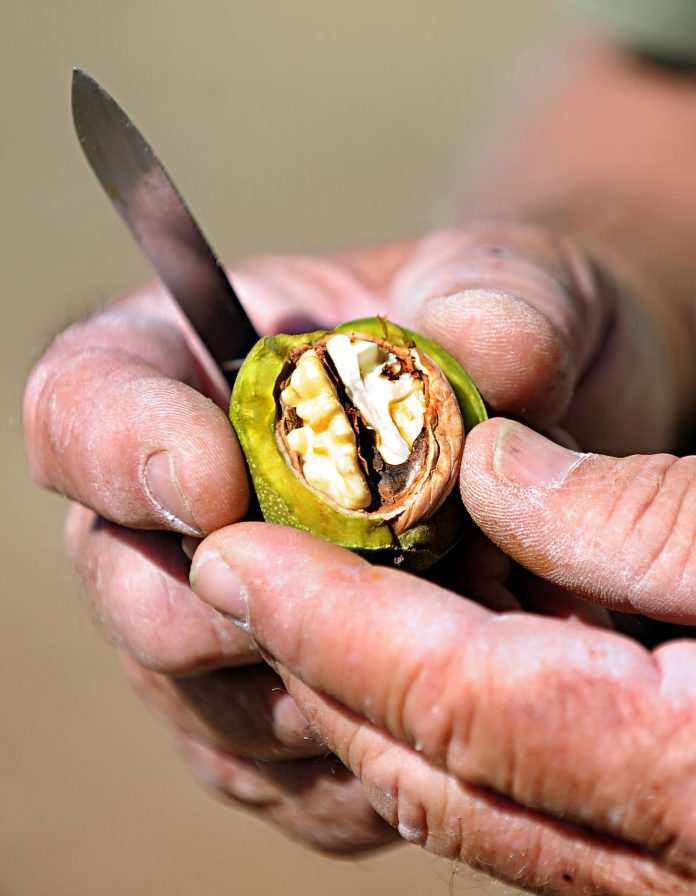
The orange-red turkey trills and stretches her long neck up to take a look at Tres Pinos resident Paul Hain.
She has no idea that in two months, she’s going to be dinner.
That’s because Paul and his wife, Leti, own Hain Ranch Organics, a poultry and walnut business in Tres Pinos where everything is raised—a la natural—without antibiotics or growth hormones.
“What causes them to need growth hormones and antibiotics is the way that conventional people grow them, which is in a big house with 20,000 other birds,” Hain said. “This is just the opposite. We tell people ‘you know, these chickens they only have one bad day in their life—and that’s for about a minute and a half and that was their destiny.’”
The Hains began their foray into the field of poultry raising 14 years ago, when Joe Morris of the San Juan Bautista-based Morris Grassfed Beef mentioned there was a market for grass-fed poultry and suggested they give it a try. An experiment that started with just a few chicks grew into a business that now produces between 2,500 and 3,000 chickens and turkeys a year.
But in mid-July, Hain transferred responsibilities for income and expenses to a young married couple so he could focus more on his organic walnut orchard since the price of the California nut has skyrocketed in recent years.
The couple, Edgar Mendoza and his wife, Kaley Grimland, have an 18-month contract to run the chicken business with Hain gleaning 25 percent of the profits they make during that time.
Hain’s property is home to “stacking enterprises,” meaning his 20 acres of walnut trees provide shade and good bug-eating grounds for the chicken business. The birds first step outdoors onto the grass beneath the walnut trees when they are 2 weeks old and their caretakers plop them into a 10-foot-by-12-foot coop with wheels that is 2.5 feet tall and can be lifted and rolled to various parts of the pasture in the orchard.
At the ranch, customers can get a truly hands-on experience when it’s harvesting time, as Hain invites them all to show up at his home for a day of chasing down turkeys and plucking feathers. They can participate in the butchering process—or not—but those who don’t come get the second pick of the turkeys.
Buying an organic bird is not a cheap endeavor. The turkeys cost between $5.50 and $7.50 a pound depending on the bird’s breed, meaning a 20-pound bird could cost between $110 and $150. The chickens cost between $6.50 and $7 a pound, meaning a 3-pound chicken can weigh in at $20.
“I think that especially older people—especially older women cannot comprehend it at all—it’s just a foreign thought to pay $20 for a chicken. They grew up when you put chicken in every pot and it’s cheap. So it’s just sometimes breaking through, but once people—once they understand what a pastured bird is, they respect it,” said Hain, who notes there is no economy of scale in his production, it is labor intensive and the organic feed is nearly three times the price of the normal stuff. “Given all those factors, if they understand what it takes to produce the chicken they will do it every time because you can’t find a pastured bird in Trader Joe’s or Whole Foods or Safeway.”
Hain may be turning his attention to organic walnuts this year, but he still loves his birds—especially his turkeys.
“You are so pretty,” he said to some turkeys as he surveyed their colors and listened to their contended trills and gobbles. “I haven’t had a chance to look at you.”
The rusty red hen that stared up at him earlier is a Bourbon red turkey, a type of bird that was considered “on the endangered breeds list for turkeys,” Hain said.
“If we sell Bourbon red turkeys, people will get a chance to experience what they taste like and they’ll want one next year too,” Hain said.
The turkeys aren’t the only birds Hain has his eyes on. He’s also started developing a breed of chickens called Barred Plymouth Rocks, a type of bird that grows beautiful horizontal lines of white and black across its feathers. The breed is considered one of America’s classic dual purpose breeds with a size big enough to be a good meal at the end of its useful egg-laying life.
The chicks arrived in May, and since then, Hain has been surveying the group to select the best birds for breeding the next generation.
It’s Hain’s birds that have brought him a loyal following of customers, who keep returning for fresh eggs or organic chickens. At the Hollister Downtown Certified Farmers’ Market Sept. 10, Hollister resident Rachel Ortega stopped by Hain’s booth to say hello. She bought eggs from his ranch “many times” along with a few organic chickens before she started raising her own birds.
“I think it’s great,” she said, as she reflected on the organic production process. “I think it’s how it should be.”









